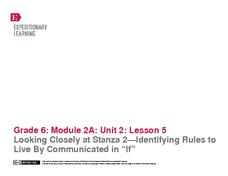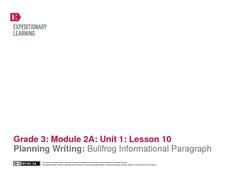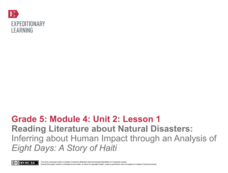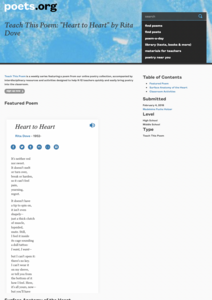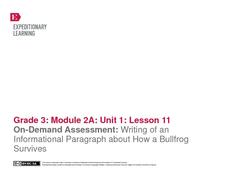West Contra Costa Unified School District
Introduction to Conditional Probability
Here is a turnkey lesson that walks young statisticians through the development and uses of conditional probability. From dice games to surveys, Venn diagrams to frequency tables, the class learns how a given can effect the overall...
EngageNY
Conducting Research: Analyzing a Variety of Sources to Capture Information about My Insect
From picture to words. Scholars analyze a picture of an ant and then list two facts they observed and any questions that may arise. Expert groups from the previous instructional activity then look at a diagram about either an ant or...
EngageNY
Looking Closely at Stanza 2—Identifying Rules to Live By Communicated in “If”
Pupils take part in a close reading of the poem, If by Rudyard Kipling, in which they delve deep into its meaning and identify its rules to live by. As the grand discussion progresses, learners then relate the poem's rules with those...
Curated OER
Take Action Haiti
Using an online internet simulation, learners will role-play various members of a family living in rural Haiti. The objective is to increase global awareness by requiring them to consider poverty as an obstacle to education in Haiti....
EngageNY
Taking Notes and Citing Quotes from Text: Gathering Information on our Rainforest Insects
In other words. Scholars practice using paraphrasing and quotes. They partner in pairs to write a paraphrase for an information text strip. Individuals then use their skills to paraphrase information from the text Fire Ants.
EngageNY
Planning Writing: Bullfrog Information Paragraph
Lesson ten in this unit for the book Bullfrogs at Magnolia Circle, prepares third graders to begin writing an informational paragraph about the adaptations of bullfrogs. First, young writers work either independently or in pairs to...
EngageNY
Documenting Research: Sorting and Recording Information About the Wheelwright
Fourth graders practice using a graphic organizer to record their notes and answer text-dependent questions while supplying evidence of how they found their answer. They focus on a machine called the wheelright, which was commonly used...
Curated OER
Summarizing
Students use their note-taking skills to write summaries of information. In this writing skills lesson, students use the notes they have taken in another lesson to write adventure stories by implementing the Rule-Based strategy.
EngageNY
Researching about the Red Cross: What Is a Multinational Aid Organization?
Lend a helping hand. Pupils read two informational articles about international aid organizations and how they help areas affected by natural disasters. Scholars attempt to uncover the gist of each text, discussing their thoughts in...
EngageNY
Reading Literature about Natural Disasters: Inferring about Human Impact through an Analysis of Eight Days: A Story of Haiti
This is a disaster. Scholars look through the book Eight Days: A Story of Haiti and discuss their wonderings about the text and natural disasters. They then complete a first read to determine gist and second read to answer text-dependent...
The New York Times
Teaching the Vietnam War with Primary Sources from the New York Times
Use the New York Times database of primary sources to teach a unit on the Vietnam War. The resource consists of a variety of primary sources as well as a lesson plan showcasing how to teach a lesson using them. Pupils analyze the sources...
Curated OER
Accordion Fold Book
You can use these basic instructions to create a book using the accordion fold. This project can be used alongside nearly any other lesson. Have kids fold a book to create a science journal, chapter-by-chapter book summary, to house a...
Curated OER
Note taking on Sources Other Than Text
Students examine different sources of information. They evaluate and take notes from a variety of sources.
Maine Content Literacy Project
Introduction to the Short Story
How should pupils read short stories? Set them up for this unit with an introductory instructional activity that goes over the main characteristics of a short story and starts learners off reading their first short story of the unit. In...
Academy of American Poets
Teach This Poem: "Heart to Heart" by Rita Dove
Take heart! Here's a lesson that will encourage learners to notice details. After listening to Sarah Vaughan singing "My Funny Valentine" and noting how the word heart relates to Valentine's Day, scholars observe a human heart image....
Read Write Think
Book Report Alternative: Rewind the Plot!
Have you ever looked for a new way to teach an old concept? Scholars thinking about the rising action of a story in a whole new perspective. However, Book Report Alternative: Rewind the Plot! challenges readers and allows for much...
US Mint
Desert Dwellers
What can a quarter possibly teach young learners about desert ecosystems? More than you might think. After displaying and discussing the included picture of the Arizona state quarter, the class participates in a series of shared reading...
Carnegie Mellon University
Introduction to Climate
Begin a full lesson on climate change by demonstrating how carbon dioxide gas contributes to increased temperatures. Be aware that pressure inside the antacid-containing bottle in Activity 2 may cause the lid to fly off; keep viewers at...
Illustrative Mathematics
Regular Tessellations of the Plane
Bringing together the young artists and the young organizers in your class, this lesson plan takes that popular topic of tessellations and gives it algebraic roots. After covering a few basic properties and definitions, learners attack...
Academy of American Poets
Teach This Poem: "The Snowfall Is So Silent" by Miguel de Unamuno
Cold, beautiful, unique! Class members closely examine John Singer Sargent's watercolor "Snow," taking note of the artist's techniques, and pair up to discuss how the image makes them feel about snow. They then repeat the process with...
Maine Content Literacy Project
Dramatic Structure of the Short Story
The second lesson in a series of fourteen, this plan takes the short story basics a step further. Learners complete a quiz about the story from the previous day, discuss the text, learn about Anton Chekhov, and work in groups to begin...
National History Day
“War Is Hell. We Know it Now.” American Soldiers in the Meuse-Argonne Offensive
Understanding the soldier's experiences during World War I sometimes takes a newscast. Learners see the importance of understanding multiple points of view with a newscast project surrounding the Meuse-Argonne Offensive. Compare and...
EngageNY
On-Demand Assessment: Writing of an Information Paragraph About How a Bullfrog Survives
Having read and discussed Bullfrog at Magnolia Circle, third graders demonstrate their bullfrog expertise by writing informational paragraphs. Building on the note-taking and paragraph planning from the previous lesson plan, learners...
Curated OER
Abraham Lincoln and Frederick Douglass: A Compare and Contrast Lesson Plan
Two great men, one time period, and one purpose; it sounds like a movie trailer, but it's not. It's a very good comparative analysis lesson focused on Abraham Lincoln and Frederick Douglass. Learners will research and read informational...




